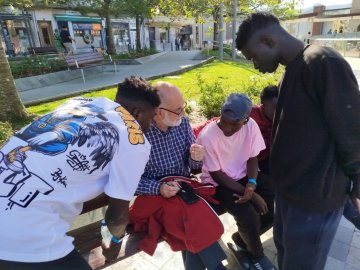Migrants Seek Asylum in Spain Amidst Ongoing Challenges
Spain has become a destination for many migrants seeking asylum, drawn by the promise of safety and stability. However, the journey is fraught with challenges, as these individuals navigate complex legal frameworks and face various socio-economic hurdles. This blog post delves into the current landscape of migration to Spain, the reasons behind this influx, and the obstacles that many asylum seekers encounter.
The Asylum Process in Spain
Navigating the asylum process in Spain can be overwhelming. The first step for migrants is to apply for international protection, which can be done at designated police stations or through the official asylum office.
Requirements for Asylum Seekers
To qualify for asylum, migrants must prove a well-founded fear of persecution due to:
Understanding these criteria is crucial for migrants as they prepare their applications. Many asylum seekers arrive in Spain after enduring perilous journeys across harsh terrains and facing numerous dangers, making their quest for safety even more critical.
The Current Challenges Faced by Asylum Seekers
While Spain offers a pathway to asylum, numerous challenges lie ahead for migrants:
1. Bureaucratic Hurdles
The asylum application process can often be slow and cumbersome. Migrants may experience long waiting times for interviews and decisions, leaving them in a state of uncertainty. Additionally, the complexity of the legal system can be overwhelming, especially for those who are not familiar with Spanish laws.
2. Limited Resources
Many migrants arrive in Spain with limited financial resources. This lack of funds can hinder their ability to find adequate housing, food, and healthcare. Asylum seekers often rely on governmental and non-governmental organizations for assistance. However, these resources can be stretched thin, particularly in areas with high migrant populations.
3. Social Integration
Integrating into Spanish society presents another significant challenge. Language barriers can complicate communication, making it difficult for asylum seekers to access essential services such as education and employment. Moreover, some communities may exhibit resistance to newcomers, leading to social isolation for migrants.
The Impact of Recent Policy Changes
In recent years, Spain has implemented various policy changes that affect the asylum process. The government has sought to streamline procedures and improve conditions for migrants. However, critics argue that these changes may not go far enough to address the systemic issues within the asylum system.
1. Enhanced Screening Procedures
To address concerns about security and the integrity of the asylum process, Spain has introduced enhanced screening procedures for applicants. While these measures aim to ensure that only those in genuine need receive protection, they can also lead to longer wait times and increased scrutiny for asylum seekers.
2. Increased Support Services
In response to the growing number of asylum seekers, the Spanish government has expanded support services, including legal assistance and integration programs. These initiatives aim to help migrants navigate the complexities of their new environment and foster a sense of belonging.
Personal Stories and Experiences
Many migrants have shared their personal stories, shedding light on the realities of seeking asylum in Spain. Their experiences often highlight both the resilience of the human spirit and the harsh realities faced by those fleeing conflict and persecution.
1. Dreams of a Better Future
For many asylum seekers, the journey to Spain represents hope for a better future. Migrants often recount their dreams of building a life free from violence and oppression. Yet, the challenges they face upon arrival can sometimes overshadow these aspirations.
2. Community Support and Resilience
Despite the obstacles, many migrants find strength in community support. Local organizations and fellow migrants often come together to create networks of assistance, providing a lifeline to newcomers. These connections can play a crucial role in helping individuals navigate the asylum process and integrate into society.
Conclusion: A Call for Compassion and Understanding
The journey of migrants seeking asylum in Spain is a complex and often harrowing experience. Understanding the challenges they face is essential for fostering a compassionate response from both the government and the public.
As Spain continues to grapple with the realities of migration, it is imperative to prioritize the needs of asylum seekers. By advocating for more accessible processes, improved resources, and community support, we can create a more inclusive society that honors the dignity and rights of all individuals, regardless of their background.
In conclusion, the plight of asylum seekers in Spain serves as a reminder of the ongoing global refugee crisis. It urges us to reflect on our responsibilities towards those who seek safety and a new beginning. Compassion and understanding can pave the way for a brighter future for migrants and the communities that welcome them.










